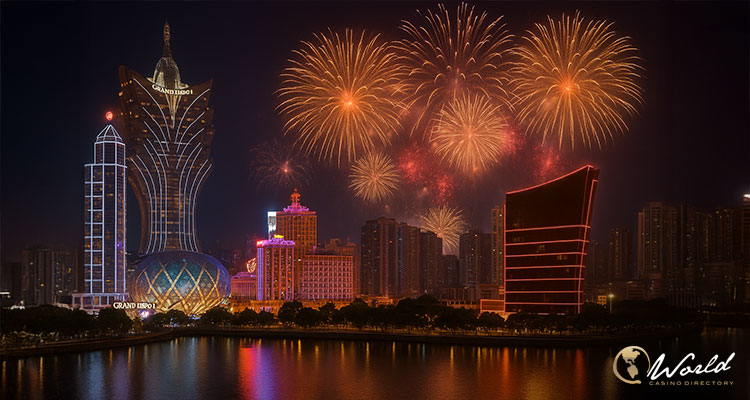Macau experienced a remarkable surge in both visitor arrivals and gaming revenue during the recent five-day Labour Day Golden Week holiday, significantly exceeding initial expectations. From May 1 to May 5, the city welcomed 850,034 visitors, averaging over 170,000 arrivals per day. This represented a 40.5% increase over the previous year’s total of around 605,000, surpassing government forecasts that had estimated 630,000 to 700,000 visitors during the period.
Visitor Arrivals Break Records
The surge in visitor numbers was highlighted by a new record set on May 2, when 221,968 people entered Macau, the highest single-day total since the pandemic. This was a significant milestone, surpassing the previous post-pandemic high during the Spring Festival. The number of visitors exceeded the previous year’s Golden Week total by approximately 33%, indicating a strong recovery for the city’s tourism sector.
In addition to the record-breaking arrivals, mainland China visitors contributed largely to the influx. A total of 678,521 visitors came from mainland China, marking a 39.6% increase over last year. The influx from Hong Kong also saw a sharp rise, with 111,189 visitors recorded, up 42.3% compared to the previous year. These two groups combined accounted for more than 90% of all arrivals during the Golden Week.
Surge in Border Movements and Traffic Management
The increased visitor traffic also translated to a sharp rise in border crossings. The collective total of arrivals and departures during the holiday period reached approximately 3.75 million. The Border Gate checkpoint, one of the busiest entry points, handled around 1.89 million crossings, while the Qingmao and Hengqin ports saw approximately 584,000 and 513,000 crossings, respectively.
With this surge in visitors, local authorities implemented special measures to manage the crowds effectively. Pedestrian zones were created near prominent landmarks like the Ruins of St. Paul’s, and certain parts of Avenida de Almeida Ribeiro were closed off to vehicles to ease congestion. This was the first time such measures had been introduced in Taipa Village for a Labour Day holiday, with traffic restrictions placed on streets near popular tourist areas.
The Public Security Police (PSP) coordinated the crowd management efforts, deploying barriers at bus stops and other crowded locations. To accommodate the surge, bus services were increased, with key routes operating at five-minute intervals. However, despite these measures, some residents voiced concerns about the prioritization of tourists over locals, especially regarding long taxi queues and overcrowded buses.
Hotel Occupancy Rates Soar
The influx of visitors also had a substantial impact on Macau’s hospitality sector. Hotel occupancy rates for the first day of the Golden Week hit over 95%, with many tourists opting for day trips from nearby Zhuhai. Maria Helena de Senna Fernandes, Head of the Macao Government Tourism Office (MGTO), expressed her satisfaction with the numbers, noting that the high occupancy rates were a positive sign of the city’s attractiveness as a tourist destination.
Since the start of 2025, the city has introduced a new “one-trip-per-week” visa for Zhuhai residents, allowing them to stay in Macau for up to seven days. Additionally, mainland Chinese residents who hold both a household registration and a residence permit for Hengqin can apply for a multiple-entry visa, which grants them the flexibility of unlimited trips to Macau, with each stay limited to seven days. These visa options have further facilitated travel, contributing to the holiday surge.
Gaming Revenue and Economic Impact
The five-day Golden Week period also saw strong results in Macau’s gaming sector. Preliminary estimates suggest that gross gaming revenue (GGR) for the period reached MOP$5.1 billion (approximately US$639 million), equating to an average of MOP$1.02 billion (US$128 million) per day. This performance represents a 12% year-on-year growth, significantly surpassing pre-holiday expectations and coming close to pre-pandemic levels. As Inside Asian Gaming reported, JP Morgan analysts called the results the “biggest beat we’ve seen in years,” especially as it contrasted with a weaker performance during the Chinese New Year.
The strong performance in the gaming sector, combined with the record-breaking visitor numbers, indicates a solid rebound for Macau’s tourism and entertainment industries. The city has now returned to around 90% of its pre-COVID May Day levels, which is a promising sign for the remainder of the year.
Outlook for Macau’s Tourism and Gaming Sectors
The success of the Golden Week has raised expectations for continued growth in both the tourism and gaming sectors throughout May. While analysts remain cautious about extrapolating a full recovery based on one successful holiday period, the results certainly provide an optimistic outlook for the coming months. JP Morgan’s analysts revised their May forecast upwards, now predicting mid-to-high single-digit growth for the month, which is a significant shift from the initial expectation of flat growth.
Looking ahead, the combination of favorable government measures, an influx of visitors, and a recovering gaming sector suggests that Macau may continue to see strong growth in the short term. However, authorities will need to maintain effective crowd control and infrastructure management to ensure a smooth and enjoyable experience for both locals and tourists.



